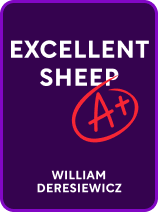

This article is an excerpt from the Shortform book guide to "Excellent Sheep" by William Deresiewicz. Shortform has the world's best summaries and analyses of books you should be reading.
Like this article? Sign up for a free trial here.
Should college students choose a career-oriented program or a major they enjoy more? What kind of mindset will help them succeed?
In Excellent Sheep, author and former Yale professor William Deresiewicz argues that college students can actively create a high-quality education for themselves. He recommends that they connect with inspiring professors, follow their interests, and expect and embrace failure.
Continue reading to learn about these three tips for college students.
Tip #1: Connect With Inspiring Professors
Deresiewicz’s first tip for college students is that they connect with inspiring professors. Although many professors are too occupied with research to form relationships with students, there are exceptions. College students can ask older students to recommend professors who are committed to the art of teaching. Then, they should attend these professors’ office hours to receive extra guidance on their journey towards self-insight.
(Shortform note: What are some ways college students can make the most of professors’ office hours? One resource advises them to see office hours as a chance to develop a relationship with a professor. This relationship could later grow into a mentorship. College students can start building this relationship by asking a professor to share more about their research interests. Additionally, students can share what they’re most curious about with a professor and request advice on what subjects or courses to pursue.)
Tip #2: Follow Your Interests
Deresiewicz’s second tip for college students is that they should follow their interests. Instead of automatically gravitating toward prestigious careers such as finance, they should take time to discover what subject areas ignite their curiosity. To explore their interests, they can take classes in a wide variety of subject areas and ask professors for guidance in selecting a good-fit major.
(Shortform note: Some college students whose interests don’t align with lucrative careers may have a hard time choosing between these majors and a major that’s more likely to guarantee a stable income. College career counselors, aware of this dilemma, advise students to choose a major based on the marketable skills it equips them with rather than the job that shares its name. For instance, a student wondering whether to major in history shouldn’t base their decision on whether they want to be a historian. Instead, they can consider some of the skills they’d gain majoring in history, such as writing and reading.)
Tip #3: Expect and Embrace Failure
Deresiewicz’s last tip for college students is to expect and embrace failure. They’ll make progress on their path towards self-insight if they learn from failure rather than fear it. Self-insight is a messy process that requires you to learn from your mistakes. He reminds students that, when they receive constructive criticism from a professor, it’s an opportunity to learn and grow—not a sign they’re inadequate.
| In Mindset, psychologist Carol Dweck argues that it’s possible to transition from fearing failure to having a “growth mindset” that embraces failure. She offers several recommendations that anyone (including college students) can follow to move towards a failure-embracing growth mindset: Be patient with yourself. When facing a new experience, such as taking a class in a new subject area, don’t expect yourself to be perfect from the start. Remind yourself: Mastering something requires time, effort, and practice. Welcome critical feedback. Typically, when a mentor, friend or loved one gives you feedback, it’s because they want to help you improve. Instead of taking the feedback as an indication that you’re a failure, remind yourself: Feedback helps me improve. Reflect and try again. If you make a goal that you later fail to meet, reflect on how you could improve next time. Ask yourself, What did I fail to do the first time that I can do better next time? |

———End of Preview———
Like what you just read? Read the rest of the world's best book summary and analysis of William Deresiewicz's "Excellent Sheep" at Shortform.
Here's what you'll find in our full Excellent Sheep summary:
- How elite colleges contribute to social inequality and harm students
- The ways that elite schools prioritize profits over teaching
- How governments, schools, and parents can overhaul U.S. higher education






